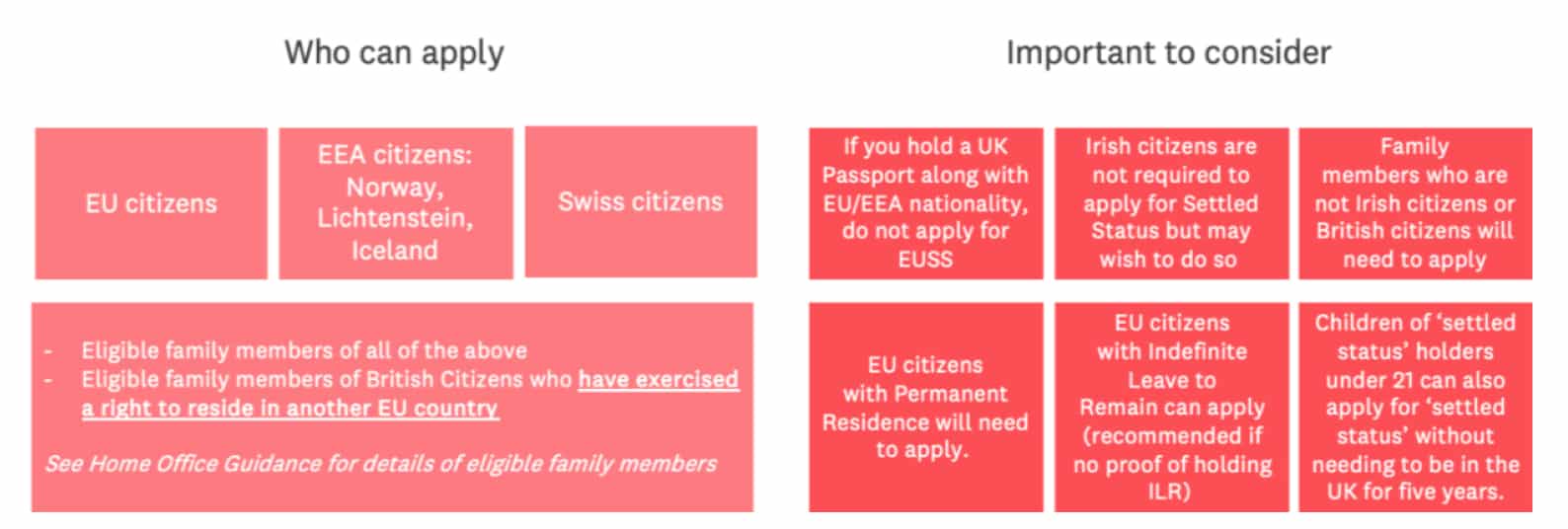Brexit information
The UK may have left the EU, but here at BIMM, we are determined to keep our community of creative students as diverse and vibrant post-Brexit as always. We are committed to being a friendly international community.
And we want to make sure you have all the information you need about Brexit and how it affects you. Whether you’re looking to study at BIMM or are a current student, this page should help answer any questions you may have.
This page was last updated on 28th January 2021
If you’re an EU, EEA or Swiss citizen who was resident in the UK by 23:00 on 31st December 2020, you can apply to the EU Settlement Scheme to obtain immigration status in the UK.
The deadline for applications to the Scheme is 30th June 2021.
BIMM Institute receives applications from all over the world. We have representatives and agents in the EU/EEA and other overseas regions. Last year, we enrolled over 1000 students from overseas countries. We know how important it is that this continues.
That’s why we are continuously developing partnerships abroad to raise awareness of our Degree and Diploma courses, which are recognised worldwide. Our dedicated admissions team will ensure your application process and is easy to navigate and that you are well-informed throughout.
Do I need a Visa to study in the UK?
If you’re an EU, EEA or Swiss citizen who is resident in the UK by 23.00 hours on 31st December 2020, you can apply to the EU Settlement Scheme to obtain immigration status in the UK. The deadline for applications to the Scheme is 30 June 2021.
This means that from 1st January 2021 any EU, EEA and Swiss nationals who have not previously been resident in the UK will need to apply for permission to enter the UK via the Student Route Visa category. You will also need to meet all the requirements for this visa category in order to receive your visa. Further information on Student Route Visa is available here.
What if I hold a EUSS Pre-Settled or Settled Status already?
It means you will not need to apply for a visa to study in the UK. Please don’t forget to share your status with our admissions team by going to www.gov.uk/view-prove-immigration-status and by emailing the share code and your date of birth to [email protected], when you apply for your chosen course.
EUSS Status holder student loan eligibility details have not yet been published by the UK Government. Information about student finance eligibility can be found on the UKCISA website.
What financial support is available at BIMM Music Institute?
We are proud to announce a range of discounts, scholarships and bursaries available to our EU/EEA (including Pre-Settled and Settled status holders), as well as non-EU applicants for 2021 entry. Please click here for further information.
Remember to join the ‘EU Settlement Scheme Students’ group on BIMM Connect – Via the International Student Group if you haven’t done so already.
We post updated information on dedicated BIMM Connect EU Settlement Scheme Students group regularly, share useful resources and videos to help you with your EUSS application.
We also offer a bespoke 1-2-1 Advice service to those who need additional guidance and support.
Citizens rights’ after the UK leaves the EU
There will be no change to the rights and status of EU, EEA and Swiss nationals currently living in the UK until 30 June 2021.
To continue living, working and studying in the UK after the end of the Brexit transition period (31 December 2020), you and your family must apply to the EU Settlement Scheme. Successful applications will be granted ‘settled’ or ‘pre-settled’ status, depending on how long you have been living in the UK.
Those with five years’ continuous residency will be granted settled status and those with less than five years will be granted pre-settled status.
Those granted settled statuses can stay in the UK as long as they like. Those granted pre-settled status can stay for a further five years from the date they get pre-settled status and can apply for settled status once they reach five years of continuous residency.
With settled or pre-settled status you’ll be able to:
- Work in the UK
- Use the National Health Service
- Enrol in education or continue studying
- Access public funds such as benefits and pensions, if you’re eligible for them
- Travel in and out of the UK.
Do I need to apply for the EU Settlement Scheme?
Students on programmes that end after 31 December 2020
If you arrived in the UK before 31 December 2020 and your programme will end after 31 December 2020, you should apply to the EU Settlement Scheme.
Without settled or pre-settled status, you will no longer have the same residential status in the UK beyond 31 December 2020 and will be required to apply for a visa under the new immigration system which is being introduced from January 2021.
If you have not applied to the EU Settlement Scheme, your ability to remain on your programme may be affected after 31 December 2020 until you have applied for a visa.
Note that Irish citizens and students with indefinite leave to remain in the UK do not need to apply.
Students on programmes ending before 31 December 2020
If your programme ends before 31 December 2020, and you are eligible to apply to the EU Settlement Scheme, it is your choice whether or not you do so. This will depend on your plans after BIMM, and whether you intend to stay living in the UK after 1 January 2021.
However, if you are an EU/EEA/Swiss students and you are eligible to make an application to the Settlement Scheme, we advise you to do so. If you do so, it will keep your options open in case your circumstances or plans change. For example, you may decide that you wish to stay on in the UK for further study, or for a job opportunity.
The settlement scheme is not only for those who intend to remain in the UK long term after studying. It is an immigration permission which will enable those who are here now to stay after Brexit, should they wish to do so.
If you do not secure your status through the EU Settlement Scheme and subsequently decide, after the application deadline, that you wish to remain in the UK, you would need to apply for another immigration status under the new immigration system which is being introduced from January 2021. See further information on the UK Government’s proposals.
The application process has been designed to be easy and user-friendly, and there is no fee.
How do I make an application to the EU Settlement Scheme?
The UK government have produced a step by step guide on applying to the EU Settlement Scheme.
The UK Council for International Student Affairs (UKCISA) have also produced guidance on how to apply.
Proof of identity
You should use the ‘EU Exit: ID Document Check’ app to complete the identity stage of your application.
The app will:
- check that your identity document is genuine
- verify that the document belongs to you.
You must use either:
- Your biometric passport from an EU country, Iceland, Liechtenstein, Norway or Switzerland
- Your UK residence card with a biometric chip if you are the non-EU family member of an EU, EEA or Swiss citizen.
There is further guidance on using the app on the UK government webpages.
Proof of residence
The Home Office will do checks against other government databases to check that you have been resident in the UK. You will be asked to provide your National Insurance (NI) number, if you have one.
There is no requirement for you to have a NI number or to have worked in the UK to be eligible under the scheme. If you do not have one, the Home Office will ask you for evidence from a list of documents in Annex A of the Home Office guidance on the settlement scheme.
How will Brexit affect my student loans?
If you’re continuing a course in the 2019-20 or 2020-21 academic year and are eligible under the current rules to receive loans from Student Finance England, you will continue to remain eligible for the duration of your course.
Find out more about student finance eligibility on the UKCISA website.
- Who can apply for the EU Settlement Scheme?
- What happens if I don’t apply?
- What do I do if my continuous residency has been affected negatively by COVID 19?
- How do I know that I am resident in the UK and eligible for the EU Settlement Scheme?
- What is the difference between settled and pre-settled status?
- Is the application process different for settled and pre-settled status?
- How do I prove my residence?
- I have dual nationality. Should I apply for settlement status?
- If I leave the UK, do I lose settled status?
- How will BIMM keep me updated?
- Where can I find further information?
Who can apply for the EU Settlement Scheme?
The EU Settlement Scheme is applicable to nationals of the following countries:
Austria, Belgium, Bulgaria, Croatia, Republic of Cyprus, Czech Republic, Denmark, Estonia, Finland, France, Germany, Greece, Hungary, Iceland, Ireland, Italy, Latvia, Liechtenstein, Lithuania, Luxembourg, Malta, Netherlands, Norway, Poland, Portugal, Romania, Slovakia, Slovenia, Spain or Sweden or Switzerland.
What happens if I don’t apply?
Those who do not apply by the deadline will effectively become undocumented and may be vulnerable to being withdrawn from your course and removed from the UK. Alternatively, you will need to obtain a UK visa under the new Points Based Immigration System, which will be launched at the end of 2020.
What do I do if my continuous residency has been affected negatively by COVID 19?
Please email the International Team ([email protected]) for further advice. Please remember to confirm in your email the date when you left the UK and the date you intend to return to the UK.
How do I know that I am resident in the UK and eligible for the EU Settlement Scheme?
If you started living in the UK before 31 December 2020 you are considered as resident, and therefore eligible to apply.
An exception to this is if you are a registered student and are currently overseas for study purposes (such as study abroad, a work placement or research fieldwork). In this case you are permitted to be absent for a single period of up to 12 months and can apply from overseas.
What is the difference between settled and pre-settled status?
Settled status – allows you to remain in the UK indefinitely and you can continue to study and work without restriction. You can also access any public funds you may be eligible for and use the National Health Service (NHS). You are free to travel in and out of the UK.
After obtaining settled status you can spend up to five years outside the UK without losing your status and you can choose to apply for British citizenship.
Pre-settled status – gives you permission to remain in the UK for a further five years from the date that you were granted this status. Once you have reached five years continuous residence, you can apply again to obtain settled status if you want to remain in the UK longer. However, you must apply before your five years on pre-settled status expires if you wish to remain in the UK.
Whilst in the UK with pre-settled status you can continue to study and work in the UK without restriction. You can also access any public funds you may be eligible for and use the National Health Service (NHS). You are free to travel in and out of the UK.
After obtaining pre-settled status you can spend up to two years outside the UK without losing your status.
Is the application process different for settled and pre-settled status?
The application for settled or pre-settled status is the same process through the EU Settlement Scheme. You don’t need to choose which status you are applying for.
Settled status – to be granted settled status you must complete the EU Settlement Scheme application and demonstrate that you have been resident in the UK for the last five years with no absences of longer than six months in any 12 month period. In exceptional circumstances, a one-off absence from the UK of up to 12 months (such as for study abroad, pregnancy, childbirth or work posting can be discounted as absence. Any periods of compulsory military service are also allowed.
You must have started living in the UK before 31 December 2020. If you are under 21 and are applying with your parents, you may not need to have been resident in the UK for five continuous years to obtain settled status if your parent(s) have met the requirements.
Pre-settled status – to be granted pre-settled status you must complete the EU Settlement Scheme application and demonstrate that you are resident in the UK.
You must have started living in the UK before 31 December 2020 but there is no minimum time you need to have spent in the UK in order to be eligible.
How do I prove my residence?
Settled status – to be granted settled status, you will need to evidence that you have been resident in the UK for five continuous years. If you have been working in the UK during the last five years, the easiest and quickest way to prove this is by providing your National Insurance (NI) number on the form. UK Visas & Immigration (UKVI) can check this with HM Revenues & Customs by accessing your NI records. In this case no further documents will be needed to prove residence.
If you have not been working some or all of the last five years, you can upload evidence of your residence to your application. Acceptable documents include annual bank statements, letters from your school or university confirming your attendance, or tenancy agreements. All documents you provide must be dated and have your name on them. Further details are available online.
If you have had an absence from the UK of longer than six months but less than 12 months for one of the ‘exceptional’ reasons listed above, you will need to provide official evidence.
Pre-settled status – if you have been resident in the UK for any period of time less than five years, you will need to provide evidence that you were resident in the UK before 31 December 2020 when you apply.
Only one piece of evidence of residence is required to obtain pre-settled status. The document must be less than six months old. If you have a National Insurance (NI) number and you have been working, the NI number should be sufficient evidence for pre-settled status.
If you don’t have a NI number and/or you haven’t been working, you can provide other evidence to support your application. Acceptable documents include a student status letter from the University.
I have dual nationality. Should I apply for settlement status?
You will not need to apply if you have dual British citizenship. If you have dual EU and non-EU nationality, you can apply for settlement status using your EU passport.
If I leave the UK, do I lose settled status?
If you have settled status, this would be lost after an absence of five years from the UK (this is still subject to approval from Parliament).
If you have pre-settled status, this would be lost after an absence of more than two years from the UK.
If you lose your status and you are no longer eligible to apply under the settlement scheme, you will only be able to apply under any other category of the Immigration Rules in place at the time you wish to come to the UK.
How will BIMM keep me updated?
BIMM Music Institute will communicate with current students directly via your student email address when there are significant updates. This website will also be regularly updated and revised to reflect up-to-date information.
Where can I find further information?
There is information on the UK government’s Get Ready for Brexit website. You can also sign up for email alerts about new or updated information related to Brexit.
The UK Council for International Student Affairs’ website has lots of information about Brexit which is specific to students.
Want to speak to someone about Brexit?
- If you’re a current student, then please email [email protected]
- If you’re a prospective student, please contact our Admissions Team via email [email protected]



